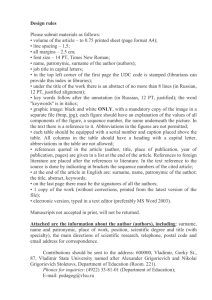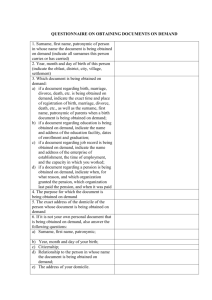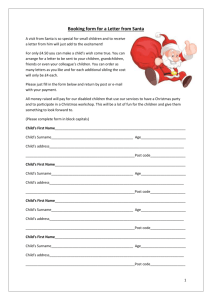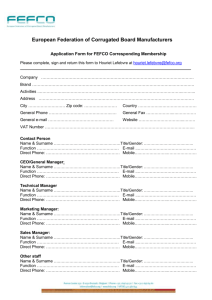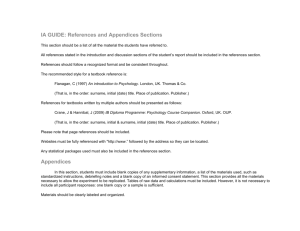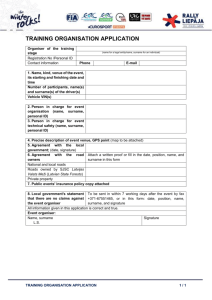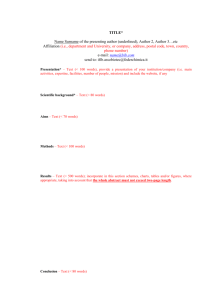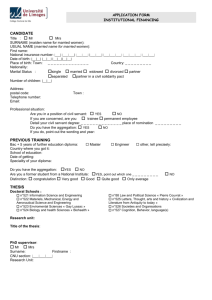provision
advertisement
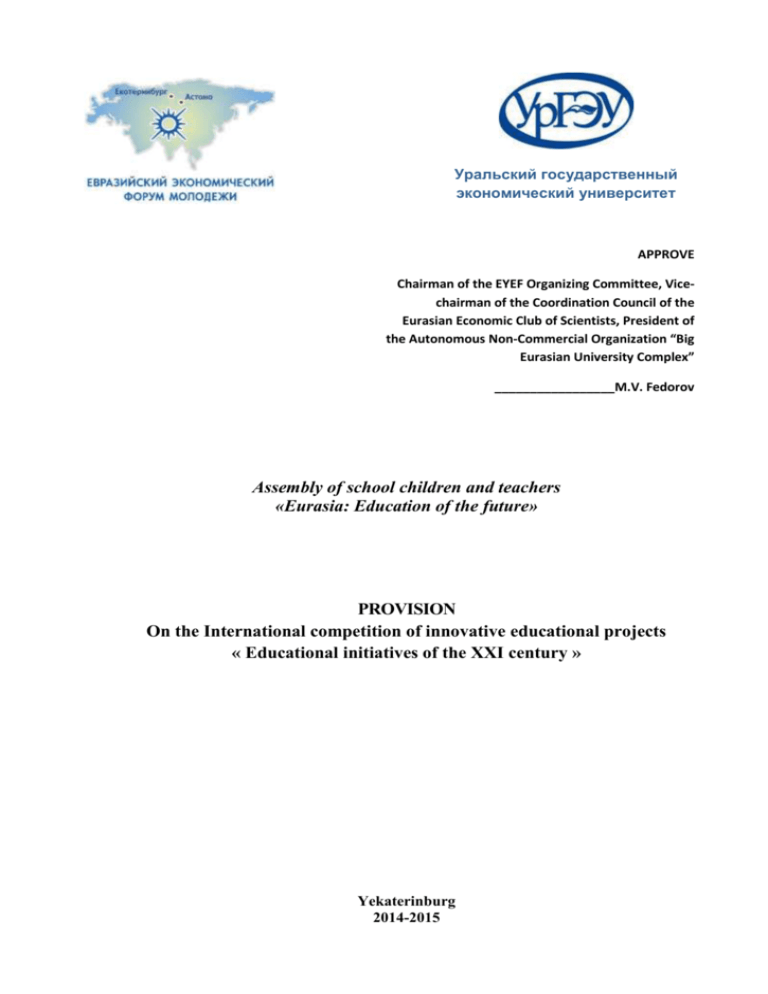
Уральский государственный экономический университет APPROVE Chairman of the EYEF Organizing Committee, Vicechairman of the Coordination Council of the Eurasian Economic Club of Scientists, President of the Autonomous Non-Commercial Organization “Big Eurasian University Complex” _________________M.V. Fedorov Assembly of school children and teachers «Eurasia: Education of the future» PROVISION On the International competition of innovative educational projects « Educational initiatives of the XXI century » Yekaterinburg 2014-2015 1. General provisions 1.1. The provision defines a general procedure of the International competition of innovative educational projects “Educational initiatives of the XXI century” organization and holding. 1.2. The international innovative educational project competition «Educational initiatives of the XXI century» (hereinafter referred to as competition) is conducted within the V Eurasian Youth Economic Forum “Dialogue of civilizations: green economy”. 1.3. Competition principles: publicity (transparency); voluntary based participation; participants equality; project expertise independency; mutual responsibility of competition participants and organizers. 1.4. The competition organizer is the Ural State University of Economics and partners of the V Eurasian Youth Economic Forum 1.5. Competition coordinator is the Pre-university tutorial administration of the USUE. 2. Targets and objectives 2.1 The competition target is consolidation of community promoting innovative educational products of the XXI century; joint creation of the modern ways of education development; effective modern education model development. 2.2 Competition objectives - Analysis of educational problems and trends of modern educational development - All education bodies involvement into the educational institutions modernization and development - New innovative and unconventional solutions for educational system development which correspond to the new and future society requirements - Present educational model building 3. Competition participants: 3.1. Individual authors and teams (up to 3 persons) can take part in the competition: schoolchildren (8-11 forms); students and young scientist aged up to 35 years; college and school teaching staff. 4. Applications 4.1. Applications must be filled in a form of an application sample provided in the Appendix. The application should contain all the necessary attachments and documents also listed in the Annex 1-5. 4.2. Competition projects and thesis (not exceeding 2 pages) can be submitted till March 30, 2015 and only in soft format on the web site www.eurasia-forum.ru through the personal cabinet of the participant. The project copy mast be sent to the e-mail pr-com@usue.ru Every participant has to register on the forum official web site www.eurasia-forum.ru. 5. Competition procedure and schedule 5.1. The competition is held since October 31, 2014 till April 30, 2015 5.2. The competition is carried out in 2 stages: 1 stage. SELECTION STAGE (till April 04, 2015) – preliminary distant assessment of the project by the experts with respect to conformance with the competition topic. 3 stage. FINAL (April 20-25, 2015 USUE, Yekaterinburg, Russia) – public presentation of the projects. Defining if the winners, awarding ceremony. Participation in competition final is free of charge. 5.3. Projects submitted after the deadline are not accepted for participation 6. Assessment criteria: 6.1. Project expertise procedure is defined by the organizing committee in accordance with the Provision 6.2. Project assessment criteria: competition topic relevance; topic urgency; relevance to the level of training and age of the participant; approach novelty; use of definite figures and empiric data; practical importance and application; constructivity and ability to proof report thesis; distinctiveness and creativity of presentation; team work and cohesion; visual aid quality; public speaking. 6.3 10 point assessment system is applied. The highest score is 10 and the lowest is 1. 6.4 By the committee decision the following places are given I, II, III. Project format requirements: 1.0 line spacing, А4 paper format, Times New Roman, font size 12, margins on each side - 2 cm. For each research project the article with the thesis containing the main idea of the project must be prepared. There are the following requirements: 1.5 line spacing, А4 paper format, Times New Roman, font size 14, margins on each side - 2 cm. The text must not exceed 2 pages. 7. Competition committee 7.1 The competition committee is formed from among the highly qualified teaching staff, leading scientists and specialists, competition organizers, invited experts representing educational institutions and other establishments. 7.2 The competition committee members will be announced till March 31, 2015. 7.3 Committee member responsibilities: Project assessment at the selection stage Participation in competition expert board activity at the public presentation stage; Selection of the winner; Keeping the competition Minutes of Meeting. 7.4 Based on the results of final project presentation the Expert Committee defines the competition winner. 7.5 The competition committee has a right to allocate/create special categories. 8. Results making 8.1 All the participants are awarded with the participation Certificates 8.1 By the committee decision the following places are given I, II, III. 8.3. Special prizes and titles are announced on the decision of the competition committee. 8.4. The winning projects are published on a special EYEF publication. Publication is charged – 100,00 (One Hundred) rubles. The payment can be effected by every convenient way. 9. Contacts. 620144, Ekaterinburg, 8 Marta Street, 62, Ural State University of Economics. Ph. 8(343) 251-96-43, 257-02-27, e-mail: pr-com@usue.ru Competition coordinator – Popova E. A. Annex 1. Application of participant Application for participation in the international competition of innovative projects in education “Educational initiatives of the XXI century” 1. Name, surname, patronymic 2. Date of birth 3.Educational institution (name, location), position/year of study 4. Project title 5. Contacts - ph number - e-mail 6. Name, surname, patronymic of the scientific advisor, position Please name the file as «Your name, surname, patronymic_ заявка.doc» Annex 2. Project front page sample «Educational initiatives of the XXI century» International competition of innovative educational projects Project «Project name» Team manager: surname, name, patronymic, position, place of employment, scientific degree (if any) Project team members surname, name, patronymic, educational institution City, country 2015 Annex 3. Project format sample Project content and format requirements Structural elements: Front page (ref. Annex 2); Content; Introduction; The core part; Conclusion; Literature list; Appendixes/addendums. Introduction Introduction should contain the following items: Topic urgency; Target and objectives; Project object and subject; Practical value; Project structure. The core part Project core part can be divided into two parts: theoretical and practical. Each part can consist of several chapters, which are divided into paragraphs. The theoretic part the subject matter of the problem is described based on the studied materials. Different approaches of the problem solutions are considered and the author opinion is presented. The practical part has an analytical character. It represents the problem analysis based on the definite example and economic calculation is provided. The clear offers, solutions and recommendations developed are also presented in this part. Every chapter may include 1-2 paragraphs which should be approximately of the same size. Each paragraph should ends with the conclusions. The chapter conclusions should be more comprehensive and wide. Every chapter starts with a new page. Paragraphs are organized in the context and divided from each other by 1 line spacing. Conclusion All the theoretic and practical conclusions are summarized in the conclusion and the solutions representing research results are provided. The conclusions as well as solutions should be clear, succinct and provide full understanding of the project content, importance, feasibility and effectiveness of the made developments. The conclusion should explain the connection of the project topic with the wider sphere of application i.e. to ensure topic urgency in terms of research prospects. Conclusion must contain: - Short conclusions of the project chapters; - Assessment of solution completeness; - Feather problem research prospects. Appendixes Appendix should include the support material like tables containing support figures, instructions, computer printing out, illustrations, questionnaire samples, reports and other documents. Literature list is the final page of the project and is listed in an Alphabet order. It starts with the separate page. Only the literature used and studied directly during the process of project preparation should be indicated in the list. Please name the file as «Your name, surname, patronymic_ работа.doc» Annex 4. Thesis (summary) format example 1. Summary should contain the following infromation: Topic name (category); Name of the educational institution providing the project for competition, its location; Summary name; Surname and name of the author(s); Year of study; Surname, name, patronymic, position and place of work of the scientific advisor; Summary text (1.5 line spacing, А4 paper format, Times New Roman, font size 14, margins on each side - 2 cm) Reference list is places in the summary text after the heading “Literature”. 2. Summary text is a brief description of the completed work and contais the following information: Brief statement of the objectives (what is the goal of research); Objective relevancy and opportunity of its practical applicability (explain why the objective was chosen, its scientific and practical importance); Description of task solving methods (explain what methods of research, experimental equipment and tool of data processing were used); Analysis of the gathered data (formulate the main results received during work completion, define their value for scientific and practical use, assess their novelty, explain why the got results are better than the existing results); Reference list. Please name the file as «Your name, surname, patronymic_ тезисы.doc» Annex 5 Presentation requirements Project presentation is conducted in a form of 10-minute speech and 5-minute dialogue (answers to the questions of the expert committee and audience) Presentation should be support by visual aids: slides, schemes, pictures and etc. include communication with audience; presentation should have a form of video of Power Point presentation. The following factors should be taken into account during presentation: ability of the presenter to disclose the core subject of the project, to show its importance, to demonstrate all significant aspects of the creative project, to represent the results, conclusions and prospects. In the case of project presentation in foreign language the project text should be provided both in foreign and Russian language.
